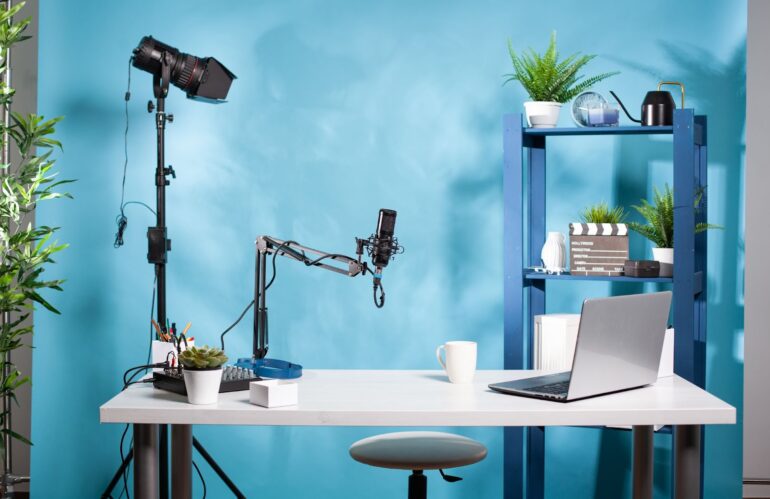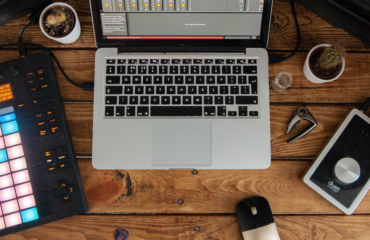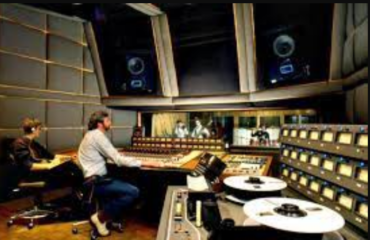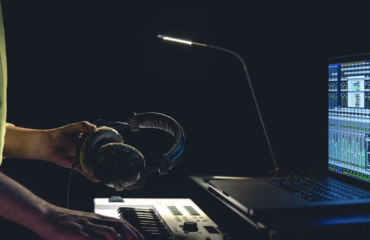Every artist, whether a seasoned professional or an enthusiastic beginner, contemplates the same question – should I set up a studio at home or should I go for a professional recording studio? There is no one-size-fits-all answer to this, as the choice often depends on your personal needs, resources, and career aspirations.
Home Studio vs. Professional Recording Studio: Understanding the Differences
This article will delve into the differences, benefits, and drawbacks of each type of studio, equipping you with the insights needed to make the best choice for your musical pursuits.
Home Studio: A Personal Creative Hub
Often colloquially termed the “bedroom studio,” a home studio (HS) is a creative space tucked within the comfort of your own home. It could be situated in a spare bedroom, the garage, or even a dedicated corner of your living room.
For many, this type of mixing and mastering room is a perfect starting point, especially for beginners or hobbyist musicians.
Professional Recording Studio: A Purpose-Built Music Haven
Contrastingly, a professional recording studio (PRS) is a specifically constructed space intended solely for capturing audio in a controlled environment. These soundproof rooms are meticulously designed to offer an optimal recording environment.
A critical distinguishing factor is the presence of an in-house sound engineer who helps artists during their recording sessions.
Setting Up Your Home Music Studio
The allure of a home audio laboratory often lies in its comfort, convenience, and potential for customization. However, it’s crucial to remember that while PRSs are built for recording, a home sound engineering room’s design may be constrained by the available space within your residence.
Essential factors to consider when setting up your recording workshop include dedicated work areas, tidiness, and creating an inspiring environment. When space is limited, switching to a PRS might provide a more conducive environment, devoid of distractions, for your music production sessions.
The Pros and Cons of a Home Music Studio
HSs come with their unique set of advantages and challenges:
Advantages:
- Swift recording of your ideas
- Personalization of surroundings to suit your tastes
- Budget-friendly (you pay only for the necessary equipment)
- No need for commuting
- Access to home comforts like your kitchen
Disadvantages:
- Restricted space for equipment and visitors
- Need to buy and set up your gear
- High costs associated with soundproofing
- Potential distractions from household members and other sources
Home Studio Equipment Essentials
Depending on what you aim to create, your home recording mixing and mastering equipment may vary. Here are some suggestions for equipment essential for different artist types, from bands and producers to DJs and podcasters.
For Bands and Producers:
- Studio Monitors
- Headphones
- Audio Interface
- DAW (audio-editing software)
- Microphone
- Pop filter
For DJs:
- Monitors
- Headphones
- DJ Controller
- USB Stick
For Podcasters:
- USB Mic
- DAW (audio-editing software)
While this list can help you get started, the best equipment for you will depend on your individual needs and budget.
Professional Soundproofing vs. Home Studio Acoustics
One key disparity between a PRS and a home audio laboratory is room acoustics and the sound-absorbing materials used. Professional workshops are designed to provide the purest sound representation and are thoroughly soundproofed.
Achieving similar acoustics at home can be a challenge, but there are ways to improve your HS’s acoustic treatment without breaking the bank. These include choosing a suitable location, considering absorption objects, carefully placing sound-absorbing material, and even creating a DIY Vocal Booth.
Costs and Effort: Home Studio Setup vs. Professional Studio Rental
Whether you’re opting for a professional-grade home studio or renting a professional space, the investment can vary significantly. For some, the cost of creating such a room can escalate quickly, especially if it includes high-end gear and soundproofing.
In such cases, renting a professional mixing and mastering laboratory, with access to industry-standard equipment, could be a more cost-effective option. It’s essential to assess your specific situation before committing to either option.
Maintenance of Your Studio
Regardless of where your recording workshop is, maintenance plays a vital role in preserving the longevity and performance of your equipment. This includes correctly setting up and packing down your gear and ensuring regular cleaning.
When to Choose a Home Studio vs. Professional Studio?
The choice largely depends on your individual needs. A home recording workshop may be ideal if you need a readily available space for quick ideas and daily projects. In contrast, a PRS could be more suited when working with guests, needing a distraction-free environment, or requiring expert sound engineering services.
Ultimately, your decision between an HS and a PRS should be informed by your goals, resources, and commitment to your music. It’s worth exploring both options and perhaps trying out a professional audio laboratory before investing in a full home setup. After all, the best music is often born in the most suitable environment.
Key Takeaways
| Aspect | Home Studio | Recording Studio |
|---|---|---|
| Definition | A personalized creative space situated within your own home. | A dedicated, meticulously designed space for capturing audio. |
| Setup | Generally, easier and less expensive. | Intricate and costly due to its professional design and construction. |
| Distinct Features | Convenience, comfort, personalization, and budget-friendliness. | Superior acoustics, soundproofing, and access to professional equipment. |
| Suitable for | Quick idea recordings, home-based work, regular projects. | Collaborative projects, final mix-downs, and soundproof vocal recordings. |
| Equipment Requirement | Relatively minimal and can be customized based on personal needs. | A wide range of high-end, industry-standard gear. |
| Cost | Depending on the equipment, the cost can range from budget to high-end. | Can be more cost-effective for occasional use, despite higher hourly rates. |
| Maintenance | The responsibility lies with the individual, care guidelines from manuals. | Handled by professionals, including sound engineers. |
| Soundproofing/Acoustics | Improvable but generally less optimal than professional studios. | Optimally soundproofed and acoustically designed. |
Conclusion
Choosing between an HS and a PRS involves considering a multitude of factors, including your budget, recording frequency, and long-term career aspirations. A home audio sound engineering room can be a convenient and cost-effective solution for those who regularly record and have a comfortable space for setup.
On the other hand, a PRS, with its superior acoustics and high-end equipment, might better serve those who prioritize sound quality and seek a dedicated, distraction-free environment.
Ultimately, the right choice is the one that serves your unique musical needs and goals, providing you with the best platform to express your creativity and musical talent.







